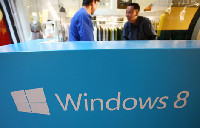 |
| Windows 8 ban may boost Chinese firms |
According to a statement this week by the Central Government Procurement Center, all desktops, laptops and tablet PCs purchased by central state organs must be installed with an OS other than Windows 8.
Although the statement did not clarify why Windows 8 cannot be used, industry experts say the move is mainly because of cyber security concerns.
Ni Guangnan, an academician with the Chinese Academy of Sciences, said Windows 8 has integrated antivirus software that frequently scan computers, which means that users of the operating system risk being monitored and national security is at danger when it is installed on government computers.
Others say the move also signals that the Chinese government is intensifying support for domestically developed operating systems in the hope that an alternative can be fostered to get rid of the influence of Windows OS.
China started to develop its own OS based on Linux in the late 1990s. There are several Linux-based operating systems developed by Chinese companies, such as Kylin OS and StartOS, but the market share of Linux in China is far from satisfactory.
Industry insiders hope that the government give more support to indigenous OS developers.
Ministry of Industry and Information Technology spokesman, Zhang Feng, told a press briefing last month that the ministry would intensify support for the development and application of Linux OS.
Internet users have also voiced their concerns. Many say they will not consider replacing their Windows OS unless the new one is user-friendly and compatible with popular software.
A large number of government and enterprise software is developed only for Windows OS, further making Linux unpopular among users.
For Linux to survive, it is crucial to build an ecosystem in which Linux OS developers, software developers and users interact actively, said Liu Wenhuan, general manager of Wuhan-based Linux Deepin Company.
Liu said the building of such an ecosystem depends on the market share of Linux OS of no less than 3 percent.
However, it is estimated that only 0.1 percent of Chinese PCs are installed with Linux OS, far from the breakthrough point of 3 percent.
"It is impossible to massively replace Windows OS with Linux with the input of only a couple of developers," Liu said.
